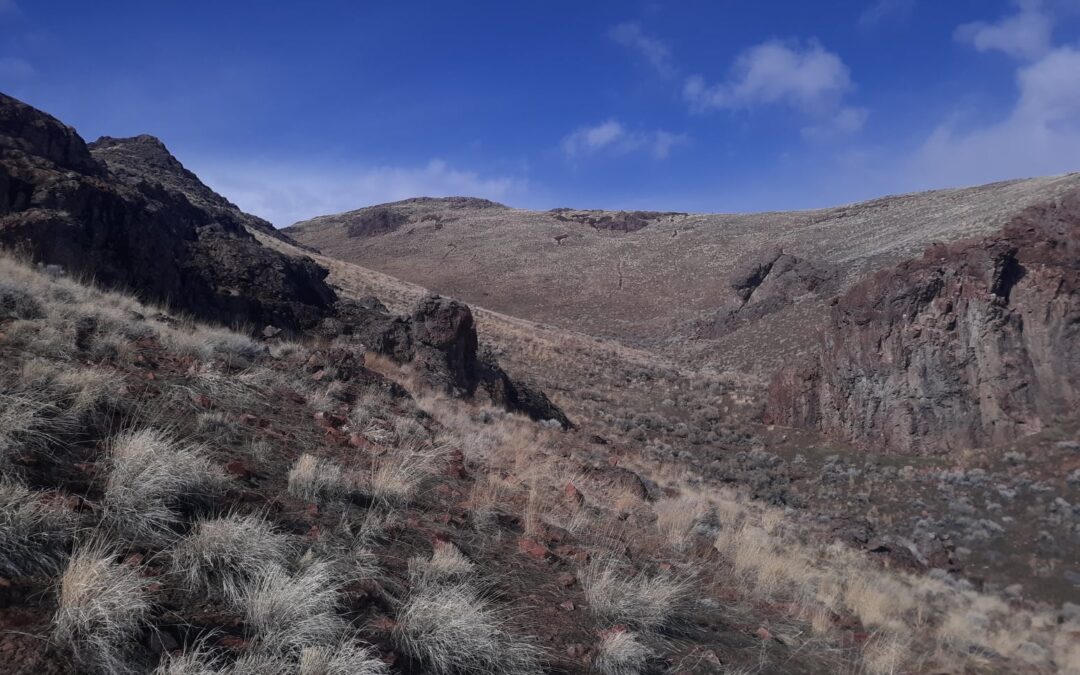Thacker Pass remembers when the hairy, pale-skinned men came to round up her people and drag them away to the forts. The hoofbeats of cavalry warhorses thundered through the basin. Pistols popped and carbines cracked. Children and elders hid in the red shadows of the Montana mountains’ caves. Fleet-footed men and women zig-zagged through the sage trying to lead the soldiers away from their families’ hiding places. A daughter’s gaze focused on her father knowing that, if he could just crest the next ridge, he could disappear into the hiding place they dug out together just the day before. A grandfather held his breath hoping his granddaughter wouldn’t trip on a stone or gopher hole. A mother recovering from childbirth prayed no lucky shot would find her baby’s father.
Thacker Pass was able to shield these people – the people the soldiers called “Paiutes,” the people who call themselves Nuwu – in her stony heights for some time. She fed them gophers, rabbits, and trout with wild onions, potatoes, and choke cherries. She gave them the clear, cold waters from the springs circling her peaks to drink. She offered them sage tea and toza root for their ailments. She held them up to the stars on the cold, windy nights to comfort them and give them courage.
But, eventually the soldiers found them. And, Thacker Pass watched with grief as white men with guns forced the Nuwu north across the Quinn River basin to live in the shadow of a fort named after a white man – McDermitt – who the Nuwu had previously killed in battle while defending their home.
I thought about this history while watching a pair of red-tailed hawks guard their nest in the same stones the Nuwu once hid in. It was another windy, sunny April afternoon. I was tired from a day giving interviews to reporters and podcasters. I was anxious thinking about whether our efforts really could stop the mine from being constructed.
The wind picked up and a swirl of dust washed over camp. As I licked the grit from my teeth and rubbed the dirt from my eyes, I heard the words of Fort McDermitt Paiute elder Elvida Crutcher as she explained to me that her ancestors were in the wind and dust.
“When the dust blows over you, that’s our ancestors,” she had told me. “When the dust blows over you, put some cedar on the fire and pray.”
So, I did.
As I prayed, I heard the engines of excavators and diesel trucks thunder through the basin. The cops and construction equipment had arrived. Mufflers popped and axles cracked. White men with guns accompanied the machinery. With how much slower Thacker Pass moves than humans, with how fast the changes in human fashion and custom must appear to Thacker Pass, I wondered if she could discern any difference in the white men with guns who came for her people a century-and-a-half ago and the white men with guns coming for her people now.
Wind and dust blew and swirled with the fear I felt in Thacker Pass. Then, I saw Nuwu ancestors rise from the stones, whisper through the sage brush, and materialize with their relatives and their relatives’ accomplices standing in front of the machinery. A daughter learned that the land is sacred to her father. A grandfather linked arms with his granddaughter, his eyes wet with tears and shining with pride, as he realized she really had been listening this whole time. A mother with a newborn in her arms watched her baby’s father prove his commitment to their child’s future.
This time, with the help of the wind and dust, Thacker Pass’ people refused to be dragged away.

Now this culture of disconnection is destroying such a noble place.
It’s sacrilege…..